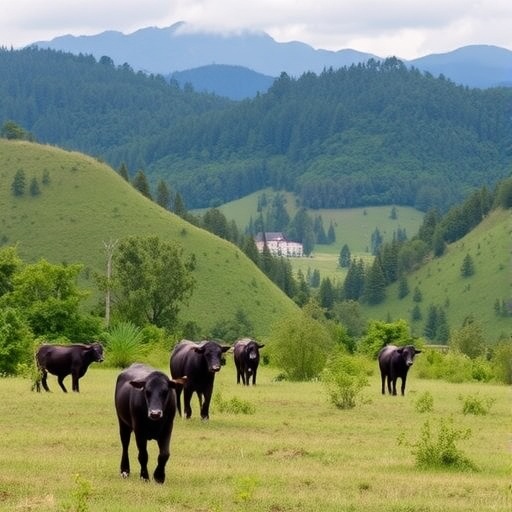A groundbreaking study recently published in Nature Ecology and Evolution has revealed that the loss of tropical biodiversity due to land-use change, particularly deforestation for cattle pasture, is substantially more severe than previously estimated by local-scale assessments. This extensive research, spanning over a decade and encompassing the diverse ecosystems of Colombia, the world’s most bird-rich country, highlights a staggering underestimation of biodiversity decline when measured exclusively at small scales.
The research team conducted the largest bird survey ever undertaken, cataloging 971 bird species across forested and converted pasture landscapes throughout Colombia. This figure represents nearly 10% of all known bird species globally, underscoring not only Colombia’s status as a biodiversity hotspot but also the importance of accurate evaluations of its environmental changes. By incorporating species’ sensitivity to habitat conversion and scaling effects across vast eco-regions, the researchers uncovered that biodiversity loss due to conversion of forest to pasture is approximately 60% more severe than previously thought.
Traditional biodiversity impact assessments have largely relied on local-scale sampling, assuming these data accurately reflect broader trends. However, this new study challenges that notion by demonstrating that local surveys miss critical large-scale patterns. Forest clearing, when occurring across extensive spatial gradients involving multiple habitats and elevations, causes disproportionate declines that local observations cannot capture. While some species persist in pastures, a significant number of others disappear across their entire ranges, emphasizing that the cumulative biodiversity loss is far greater on landscape and regional scales.
The research focused on thirteen distinct eco-regions within Colombia, each characterized by unique assemblages of plants and animals. The study found that failing to consider these eco-regional differences introduces inaccuracies, as species in different areas exhibit varying sensitivities to habitat loss. This heterogeneity means that assessments confined to single locales can neither account for the breadth of ecological impacts nor predict species extinctions accurately. Such regional variability underscores the complexity of biodiversity responses to land-use change, demanding more sophisticated, large-scale monitoring and analysis.
Professor David Edwards of the University of Cambridge, senior author of the report, emphasized the significance of these findings. He noted, “Our results show that the biodiversity consequences of converting rainforest to pasture are far worse than what local surveys suggest.” This revelation has profound implications for policymakers and conservationists. Biodiversity offsetting schemes, widely used to compensate for habitat destruction by creating or restoring habitats elsewhere, rely heavily on accurate quantifications of biodiversity loss. The study’s demonstration of systemic underestimation calls into question the effectiveness of such schemes unless large-scale impacts are properly integrated.
Central to the methodology was the innovative use of extensive birdsong recordings gathered over seven years. Given that approximately 80% of the bird detections were auditory rather than visual, the researchers utilized acoustic monitoring techniques to identify species presence across varied landscapes. This approach allowed comprehensive sampling across Colombia’s enormous environmental gradients, from low-lying pastures to high-elevation mountain forests, providing robust data on species distribution and habitat associations.
Furthermore, the study incorporated ecological traits such as body size and dietary preferences to predict how other, less-studied species might respond to deforestation. This trait-based extrapolation enhanced the understanding of broader ecological consequences beyond birds alone, suggesting cascading effects on Colombia’s rich animal communities. The linkage between species traits and habitat sensitivity will be a crucial tool for projecting biodiversity responses in other tropical regions facing similar pressures.
Colombia’s remarkable biodiversity includes some of the planet’s richest bird communities, with hotspots like the Caqueta and Napo moist forests hosting up to 600 bird species within ten square kilometers. Many of these species are habitat specialists, relying on intact forest environments that are rapidly disappearing. The study highlights the grim reality that land-use changes affecting these habitats could precipitate irreparable losses, pushing numerous species towards local or complete extinction.
The underlying driver of this biodiversity crisis is the conversion of native forests to agricultural lands, particularly for cattle ranching but also for large-scale plantations of rubber, oil palm, sugar cane, and coffee. Colombia’s expanding agricultural frontiers are clearing vast swaths of tropical forest, compounding global trends in habitat loss. This study quantifies the ecological costs of these land-use transitions with unprecedented precision, revealing the urgent need for sustainable land management strategies that reconcile food production with conservation goals.
The findings carry a critical message about the hidden environmental costs embedded in everyday consumer choices. As Professor Edwards pointed out, “The food we eat is linked to a much greater environmental damage than we previously realized.” This fact mandates a recalibration of environmental policies to consider the full spatial extent of habitat loss and its biodiversity implications. Only through integrating large-scale ecological data can conservation policies be accurately informed and effectively enacted.
In conclusion, this comprehensive research convincingly argues that reliance on local-scale assessments dramatically underrepresents the true scale of biodiversity loss due to deforestation and pasture conversion in tropical landscapes. It calls for a paradigm shift in how biodiversity impacts are measured and managed, emphasizing multi-eco-regional, large-scale analyses coupled with innovative acoustic monitoring and trait-based predictive models. As global biodiversity faces mounting challenges, studies like this provide crucial scientific foundations for designing informed conservation and land-use policies that can halt or reverse biodiversity declines.
Subject of Research: Animals
Article Title: Tropical biodiversity loss from land-use change is severely underestimated by local-scale assessments
News Publication Date: 22-Jul-2025
Web References: https://www.nature.com/articles/s41559-025-02779-4
References: 10.1038/s41559-025-02779-4
Image Credits: David Edwards
Keywords: Biodiversity loss, land-use change, deforestation, cattle pasture, tropical forests, Colombia, bird survey, eco-region, acoustic monitoring, habitat conversion, conservation policy, ecological traits




